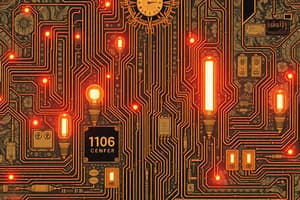Podcast
Questions and Answers
What is the primary function of an amplifier?
What is the primary function of an amplifier?
- To increase the magnitude of small input signals
- To reduce voltage across a circuit (correct)
- To measure electrical resistance
- To convert AC to DC
What is the formula representing Ohm's Law?
What is the formula representing Ohm's Law?
- R = V / I
- V = I + R
- V = I * R (correct)
- P = V^2 / R
Which of the following components is NOT classified as a passive component?
Which of the following components is NOT classified as a passive component?
- Capacitor
- Resistor
- Operational Amplifier (correct)
- Inductor
In the context of amplifiers, what does power gain refer to?
In the context of amplifiers, what does power gain refer to?
When expressed in decibels, how is voltage gain calculated?
When expressed in decibels, how is voltage gain calculated?
What is the voltage condition for an ideal operational amplifier?
What is the voltage condition for an ideal operational amplifier?
Which law must be understood as a prerequisite for studying amplifiers?
Which law must be understood as a prerequisite for studying amplifiers?
What is the formula to express the input resistance for a circuit?
What is the formula to express the input resistance for a circuit?
Flashcards
Ohm's Law
Ohm's Law
The relationship between voltage (V), current (I), and resistance (R) in an electrical circuit. It states that voltage is equal to the product of current and resistance (V = IR).
Passive Components
Passive Components
Components in an electronic circuit that don't amplify or generate signals. Examples include resistors, capacitors, and inductors.
Operational Amplifier (Op-Amp)
Operational Amplifier (Op-Amp)
An electronic circuit component designed to amplify the difference between two input voltages. It has high gain and is commonly used in analog circuits.
Ideal Op-Amp
Ideal Op-Amp
Signup and view all the flashcards
Voltage Gain
Voltage Gain
Signup and view all the flashcards
Amplifier Circuit
Amplifier Circuit
Signup and view all the flashcards
Symbol Convention (AC, DC, AC+DC)
Symbol Convention (AC, DC, AC+DC)
Signup and view all the flashcards
Amplifier Power Supply
Amplifier Power Supply
Signup and view all the flashcards
Study Notes
Introduction
- Lecture is about electronics and related topics.
Lecture Outline
- Passive components
- Ohm's Law
- Symbol Convention (AC, DC, AC+DC)
- Amplifiers
- Operational Amplifiers (Op-Amps)
Passive Components
- Resistors (R)
- Capacitors (C)
- Inductors (L)
- Symbols for each component are shown
- Relationships between voltage (v(t)) and current(i(t)) for each component
- Provided are equations defining impedance and admittance
Ohm's Law
- Voltage (V) equals current (I) multiplied by resistance (R)
- V = IR
- Example calculation of current (I) with known values of voltage(V) and resistance(R)
Symbol Convention (AC, DC, AC+DC)
- Total instantaneous current (ic(t)) is sum of DC current (Ic) and AC signal current (i(t))
- ic(t) = Ic + i(t)
- AC signal current is given by ic(t) = I sin ωt
Amplifiers
- Amplifiers increase signal magnitude
- Primarily operate on small input signals
- Considered voltage amplifiers
Amplifier Circuit Symbol
- Circuit diagrams of various amplifier types are shown
Voltage Amplifiers
- Characteristic of a linear voltage amplifier
- Voltage gain (Av)
- vo / vi = Av
Voltage, Current, and Power Gains
- Voltage gain (Av) = vo / vi
- Current gain (Ai) = io / ii
- Power gain (Ap) = powerload / powerinput
Expressing Gain in Decibels
- Voltage gain in decibels = 20 log|A| dB
- Current gain in decibels = 20 log|A| dB
- Power gain in decibels = 10 log Ap dB
The Amplifier Power Supplies
- DC power (Pdc) = Vcc Icc + Vee Iee
- Total input power = total output power
- Amplifier Efficiency = (PL/Pdc) * 100
Amplifier Saturation
- output peaks clipped due to saturation
- input and output waveform diagrams are shown
- formulas relating output and input signal values with gain
Circuit's Input/Output Resistances
- Input resistance (Rin) = Vx / ix
- Output resistance (Rout) = Vx/ix; Vin = 0 (for short circuit)
Operational Amplifier (Op-Amp)
- Circuit symbol for op-amp
- General equivalent circuit of op-amp
- Diagrams provided
Ideal Op-Amp
- V+ = V-
- i+ = i- = 0
- Definitions and explanations of terminals and supplies
Revision
- Prerequisites for the course
- Kirchhoff's Current Law (KCL)
- Kirchhoff's Voltage Law (KVL)
- Thevenin Theorem
- Superposition Theorem
Studying That Suits You
Use AI to generate personalized quizzes and flashcards to suit your learning preferences.




